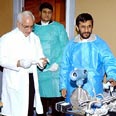
Iran nuclear offer falls short
Islamic Republic says willing to hand over bulk of enriched uranium cache on condition that exchange with fuel rods be made on Iranian territory
Iran has formally set out its terms for giving up most of its cache of enriched uranium in a confidential document, and the conditions fall short of what has been demanded by the United States and other world powers.
The document - seen by The Associated Press on Tuesday - says Tehran is ready to hand over the bulk of its stockpile, as called for under a deal brokered by the International Atomic Energy Agency and endorsed by the five permanent UN Security Council members and Germany.
But Iran adds that it must simultaneously receive fuel rods for its research reactor in return, and that such an exchange must be on Iranian territory.
The letter - which appeared to formalize a position that Iranian officials have expressed to the IAEA and the media - was sure to be rejected by the six powers.
The US and its allies have previously said that there can be no significant deviation from the original draft deal, which would commit Iran to shipping out the material first and then wait up to a year for it to be turned into fuel for the reactor, which makes medical isotopes.
The letter - addressed to International Atomic Energy Agency chief Yukiya Amano - says Iran is "still seeking to purchase the required fuel in cash." However, it was unclear how Iran would do that because there are no stockpiles of fuel specifically made for its reactor.
Iran is ready to exchange its low-enriched uranium for the fuel rods "simultaneously in one package or several packages in the territory of the Islamic Republic of Iran," the letter says.
World powers insist that Iran ship out most of its enriched uranium first, then wait for it to be turned into the fuel rods because that would delay Iran's ability to make a nuclear weapon by leaving it with too little material to make a warhead.
But amid continued Iranian rejection of the deal, that potential constraint on Tehran's weapon-making capabilities is being eroded.
Enrichment continues
When the agreement was drawn up nearly six months ago, it foresaw Iran exporting about 1.2 tons of low-enriched material for further enrichment in Russia to near 20 percent and then reprocessing in France into fuel rods. Back then, that would have been about 70 percent of the Iranian stockpile.
But Iran has continued to enrich since, and now has about 2 tons of low-enriched uranium. That means that even if it now agreed to ship the requisite 1.2 tons, it would still be left with about 800 kilograms (1,765 pounds) - about two-thirds of what it would need to enrich further to weapons grade.
Because Iran continues to enrich in defiance of the UN Security Council - Tehran says it has a right to do that to make nuclear fuel - it would thus be able to replenish its stock to what it would need to make a warhead much more quickly than half a year ago.
A senior Western official said Tuesday that - because of the time elapsed - Iran's letter appears to reject the deal the six world powers originally offered because it would no longer strip Tehran of its bomb-making ability for any length of time. He requested anonymity because he was not authorized to speak publicly on the issue.










